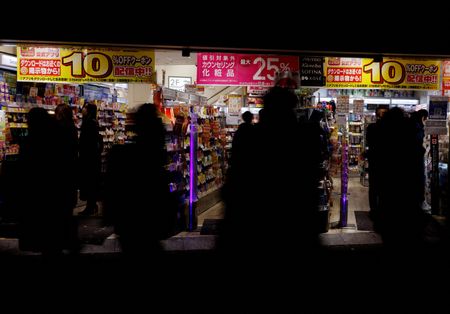By Leika Kihara
TOKYO (Reuters) -Japanese households’ inflation expectations crept up in the three months to December, a central bank survey showed, a sign that persistent rises in food and fuel costs were affecting public perceptions on future price moves.
The outcome, coupled with prospects for higher wage growth, adds to growing recent signs the world’s third-largest economy may be seeing conditions fall in place for the Bank of Japan (BOJ) to phase out its massive stimulus programme.
The ratio of Japanese households expecting prices to rise a year from now stood at 85% in December, roughly unchanged from 85.7% in September, a quarterly BOJ survey showed on Wednesday.
Households expect prices to rise an average 9.7% from current levels in one year’s time, up from an 8.5% forecast made in September, the survey showed.
The ratio of households expecting prices to rise five years from now stood at 76.7%, against 78.3% three months ago, the survey showed.
The survey on households is among data closely watched by the BOJ to determine the outlook for inflation, and how underlying price moves are affecting inflation expectations.
Core consumer prices in Japan’s capital, a leading indicator of nationwide trends, rose 4% in December from a year earlier, exceeding the BOJ’s 2% target for a seventh straight month in a sign of broadening inflationary pressure.
The BOJ will likely upgrade its inflation forecasts at a rate review next week, sources have told Reuters, underscoring its growing conviction that robust domestic demand will keep inflation sustainably around its 2% target in coming years.
BOJ Governor Haruhiko Kuroda has dismissed the chance of a near-term interest rate hike on the view the BOJ must keep supporting the economy until the current cost-push inflation turns into a demand-driven one accompanied by higher wages.
But Japan’s long-term interest rates have crept up as investors price in the chance of a tweak to yield curve control when Kuroda’s second five-year term ends in April.
(Reporting by Leika Kihara; Editing by Clarence Fernandez and Alex Richardson)

